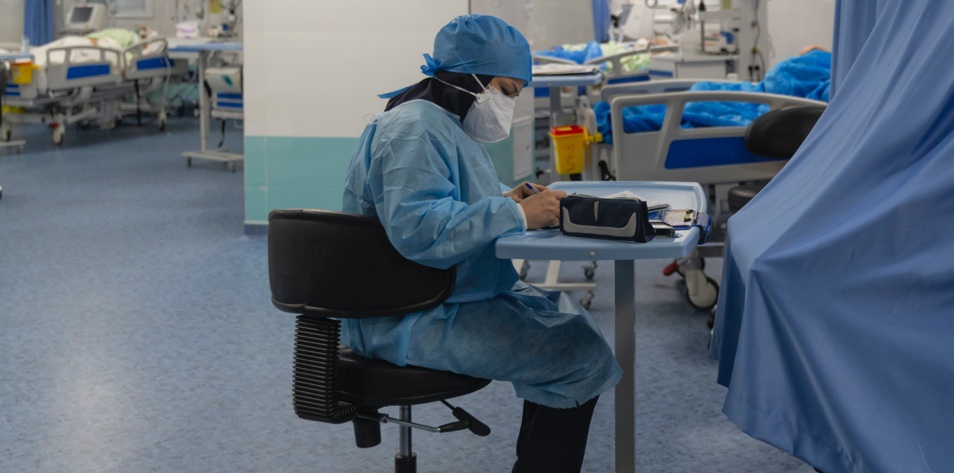
It’s been about two years since the beginning of the COVID-19 pandemic, and I have no doubt every one of us across the world has been impacted by the ripple effect it’s created. But it’s probably tough to argue that our front-line healthcare workers are some of the hardest hit. Healthcare burnout has been studied since the 1970s. We knew then, as we do now; that the physical, cognitive, and emotional demands of the healthcare profession can uniquely position its workers for extreme burnout. Luckily, we’ve made some progress with COVID-19 and every so often, can see the light at the end of the tunnel.
But even with the progress we’ve made in combating the pandemic, healthcare professionals like me are wondering if 2022 is going to be 2020, part two? So, how does the community really feel about healthcare burnout? Well, we asked healthcare professionals, and more than 100—the majority having between 6–10 years of experience—completed our recent burnout survey.
Here are the five key findings the survey revealed about healthcare burnout.
1. The Burnout is Real … and It’s Really Bad
On a scale from one to five, one indicating “no burnout” and five indicating “severe burnout,” 43% of healthcare professionals rated their level of professional burnout in the past year (2021) as four out of five.
Studies show the effects of burnout can be significant on an individual. Increased rates of alcohol and drug abuse; and increased rates of suicidal ideations have been reported in healthcare workers. Not to mention the impact it has on patient outcomes. Burnout can impair the quality of care provided, and this can lead to things like miscommunication, medical errors and potentially threaten patient safety.
“I have had feelings of dread and anxiety on the nights I work. The expectation of nurses taking on more responsibility with less help makes an unsafe environment for the very people we are supposed to care for and keep safe.”
Healthcare Professional
2. Demand Is Exceeding the Supply
The two highest rated causes of healthcare burnout were resourcing—such as staffing and supplies (19%)—closely followed by patient assignment and/or workload (18%). If you’re a healthcare professional reading this right now, you’re probably nodding your head in agreement.
One of the earliest challenges COVID-19 revealed was the lack of critical supplies, like personal protective equipment, and most importantly—safe staffing ratios. One early study about the effects of low nurse staffing showed that if hospitals followed best in practice guidelines for safe staffing ratios, 5,000 inpatient deaths could be prevented and a whopping 50,000 adverse patient outcomes could be avoided.
“COVID has only brought the ugly truth to the surface.”
Registered Nurse and Figure 1 Member
3. Help and Support Are Needed
When asked if they feel supported by their organization to express feelings of burnout, 59% of the healthcare professionals said they do not feel supported. Additionally, 41% of the healthcare professionals said their organization does not offer services or tools, such as counseling or support groups, to help prevent and/or address stress.
But perhaps change is on the horizon? Recently, the U.S. Department of Health and Human Services announced they’re awarding $103 million toward addressing the impact that burnout has on the mental health and wellness of healthcare workers.
“Bottom line is we have increased workload and continuing decrease in staff. The worst part is a lot of management refuse to acknowledge this.”
Healthcare Professional
4. And, There Just Isn’t Time
Even if there was workplace support in place, 43% of the healthcare professionals cited that not having enough time is a barrier to utilizing services and/or tools to address burnout.
“I worked almost 22 hours straight—told I had to be back and worked 12 more after less than three hours off the clock …”
Registered Nurse and Figure 1 Member
5. We Can’t Do This Anymore
When asked if over the past year (2021) they have considered leaving their current job, 72% of the healthcare professionals answered yes. And what’s worse yet, when asked if they have considered leaving the healthcare profession altogether in the past year (2021), 52% of them said yes.
A research study that surveyed over 20,000 healthcare workers discovered that, specifically amongst physicians and nurses, the intention to leave practice within the next two years has increased, with two in five nurses reporting they intend to resign.
“The one thing I learned is that it is okay to ask for help … We can be the patient too. It’s okay to not be okay.”
Registered Nurse and Figure 1 Member
Published January 31, 2022
Join the Conversation
Register for Figure 1 and be part of a global community of healthcare professionals gaining medical knowledge, securely sharing real patient cases, and improving outcomes.



